|
 Secure Site
Secure Site
|
 |
Archive for the 'Bamboo Chime Clocks' Category
 Try a Listen Meditation as a Mindfulness Practice Listening Meditation
Instructor Sally Kempton is a spiritual guide who teaches yoga and meditation at her Carmel, Calif.-based Awakened Heart Meditation (sallykempton.com). She authored The Heart of Meditation under her monastic name Swami Durgananda.
What is it? While many meditation techniques require solitude and silence, this one has you engage with the sounds all around you; it invites you to work with and use the noise instead of fighting it. Listening meditation also encourages you to harmonize with your surroundings, and, by extension, the universe. The intent is to experience sound as vibration, rather than information. The listening practice is a way of interacting with the environment that allows you to take in the whole energy of the present moment, says Kempton.
What’s it good for? Especially adaptable and portable, listening meditation can be practiced in crowded, noisy situationson a bus, at the office that would be hard on other styles. (Kempton once led a listening meditation workshop in the middle of a busy Whole Foods store!) People with particularly chattering minds may need to couple this practice with a mantra or breathing meditation. However, many people welcome the chance to focus outward rather than inward and find that listening meditation is one of the easier techniques to undertake. You’ll come away from it feeling refreshed, expanded, and at ease with your environment, declares Kempton.
How long does it take? Try for five minutes at first, then add a minute or two until you can do it for 15 or 20 minutes at a time. Set your Chime Meditation Timer by Now & Zen for five minutes and then increase as you get better at this practice.
How Do I Do It?
1. Set your Meditation Chime Timer for 5 minutes (increase the minutes as you improve). Sit in a comfortable position and close (or half close) your eyes.
2. To get centered and quiet the mind, first bring your awareness to your breath, noticing but not trying to change it.
3. Now open your ears and bring your awareness to the sounds around you. The goal is to listen to the whole range of sounds, without favoring one over another and without identifying them. Hear the quiet sounds and the silences as well as the dominant sounds.
4. When you find yourself identifying sounds (there’s a fire engine; thats the cat scratching the rug), gently redirect your attention from listening to a specific noise back to hearing the whole spectrum of sounds.
5. To end, slowly open your eyes, stand, and carry this heightened awareness with you for as long as you can.
Tip: Do a one-minute mini-listening meditation while standing in line or sitting at your desk, or anytime you feel frazzled: Close your eyes, breathe, and listen to the sounds around you. Like the practice of counting to 10 when you’re in the heat of an argument, this will help you pause, center, and regroup.
 Zen Meditation Timers, The Digital Zen Alarm Clock in Solid Walnut adapted from Natural Health Magazine
Now & Zen’s Chime Time Store
1638 Pearl Street
Boulder, CO 80302
(800) 779-6383
Posted in Bamboo Chime Clocks, Chime Alarm Clocks, intention, Meditation Timers, Meditation Tools, mindfulness practice, Well-being, Zen Timers
 Zen Timepiece Black with Long-resonating Singing Bowl
Bells, gongs, and chimes are used prominently in both Eastern and Western spiritual traditions. The use of metal alloy bowls for devotional purposes can be traced back to the beginnings of metallurgy in China prior to 1,000 B.C. The bowl that comes with your Zen Timepiece is modeled after a Japanese “rin gong,” or Keisu, that is periodically struck with a stick to punctuate sutra-reading in Buddhist temples.
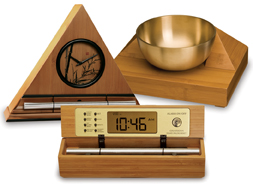 Singing Bowl Alarm Clocks and Chime Alarm Clocks Now & Zen Headquarter Store
1638 Pearl St.
Boulder, CO 80302
(800) 779-6383
Posted in Bamboo Chime Clocks, Zen Alarm Clock, Zen Timers
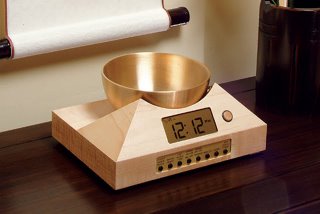 Singing Bowl Alarm Clocks are Made of Five Metals The bowl that comes with our Zen Timepiece is made from the following five metals: copper, zinc, lead, iron, and tin. It has been formed using the same forging techniques that have been used in Asia for two thousand years. Unlike hand-hammered Himalayan-style bowls, your Zen Timepiece’s rin gong bowl is made using methods which first appeared in Japan in the first century. Following these traditions, your bowl’s long-resonating tone has been carefully selected to bring beauty and harmony to your environment.
The bowl that comes with our Zen Timepiece is made from the following five metals: copper, zinc, lead, iron, and tin. It has been formed using the same forging techniques that have been used in Asia for two thousand years. Unlike hand-hammered Himalayan-style bowls, your Zen Timepiece’s rin gong bowl is made using methods which first appeared in Japan in the first century. Following these traditions, your bowl’s long-resonating tone has been carefully selected to bring beauty and harmony to your environment.
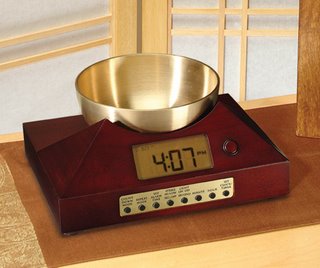 Long-resonating Singing Bowl Alarm Clocks Now & Zen
1638 Pearl Street
Boulder, CO 80302
(800) 779-6383
Posted in Bamboo Chime Clocks
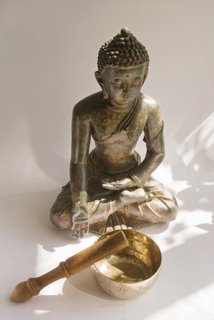 Carved Wooden Thai Buddha with Singing Bowl The Himalayan peoples have been using metal bowls in their rituals and as offerings to Deities since at least 560 B.C. These hand-hammered Himalayan alloy bowls have come to be known as “Tibetan Singing Bowls”
because of the unique way they are sounded by rubbing a mallet over the rim so as to produce harmonic resonances and overtones. Although the bowl that comes with your Zen Timepiece is not technically a Tibetan Singing Bowl, it will produce harmonic effects if a mallet or striking stick is rubbed around its edge in a circular motion.
The Himalayan peoples have been using metal bowls in their rituals and as offerings to Deities since at least 560 B.C. These hand-hammered Himalayan alloy bowls have come to be known as “Tibetan Singing Bowls” because of the unique way they are sounded by rubbing a mallet over the rim so as to produce harmonic resonances and overtones. Although the bowl that comes with your Zen Timepiece is not technically a Tibetan Singing Bowl, it will produce harmonic effects if a mallet or striking stick is rubbed around its edge in a circular motion.
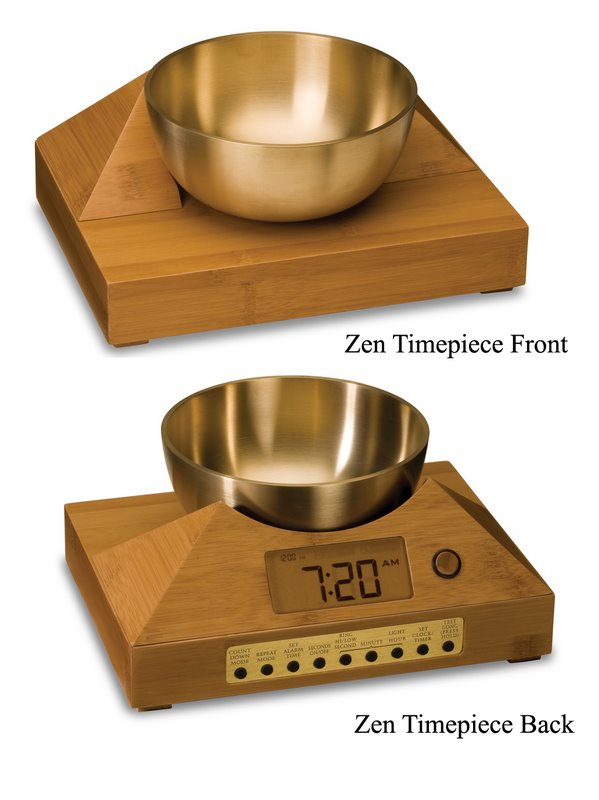 Singing Bowl Alarm Clocks for a Gentle Awakening Now & Zen
1638 Pearl St.
Boulder, CO 80302
(800) 779-6383
Posted in Bamboo Chime Clocks, Zen Alarm Clock, Zen Timers
 Therapeutic Tones Therapeutic Tones
The Zen Alarm Clock’s chime is tuned according to the ancient method developed by Pythagoras. The larger chime on model 4502 corresponds to an “E” note, and the smaller chime on model 4460 to a “B” note. However, these notes vibrate at different frequencies than their equivalent notes on a modern piano. Modern instrument tuning makes each note slightly flat or sharp so a whole range of instruments can play together. But modern tuning compromises the enchanting and therapeutic quality—the purity—of the naturally occurring tones discovered by Pythagoras. As a result of their natural tuning, the tones of your Zen Alarm Clock correspond to the vibrations of nature—the motion of the planets and the frequencies of life. This is the secret of its therapeutic effect.
The ancients took harmony very seriously. Healing music was practiced in ancient Egypt, China, Africa, and especially in the Pythagorean mystery schools. Number patterns and harmony were central to Pythagoras’ metaphysical philosophy. The Pythagoreans studied the harmonies of music as a key to understanding the harmony of the cosmos. The primary focus of the Pythagorean schools was the use of music and vibration in the healing arts. Their symbol was the pentagonal star—representing health and harmony
The ancients recognized in the seven-note scale the macrocosmic design of creation. The ancient lyre (the original ancestor of the guitar and all other stringed instruments) had seven strings. The lyre’s seven-tone scale was considered an imperfect representation of the pure vibrational pattern that orders the universe. The playing of the lyre was thought to entrain the vibrations of body and mind so as to bring them into tune with the pure vibrations emanating from the Creator.
The music of the lyre was used to heal through its affect on one’s emotions. Pythagoras was said to have subdued the murderous wrath of a drunken man and to have calmed a raging bear by playing appropriate tunes on his lyre. The ancients well knew the connection between emotions and the immune system—they used musical harmony as a way of bypassing the intellect and directly affecting one’s emotional well-being.
The Zen Clock’s long-resonating Tibetan bell-like chime makes waking up a beautiful experience – its progressive chimes begin your day with grace. When the clock’s alarm is triggered, the acoustic chime bar is struck just once … 3-1/2 minutes later it strikes again … chime strikes become more frequent over 10 minutes … eventually striking every 5 seconds until shut off. As they become more frequent, the gentle chimes will always wake you up – your body really doesn’t need to be awakened harshly, with a Zen Clock you’re awakened more gradually and thus more naturally.
 Specially tuned Zen Alarm Clock by Now & Zen, Inc. Now & Zen’s Soothing Chime Alarm Clock Store
1638 Pearl Street
Boulder, CO 80302
(800) 779-6383
Posted in Bamboo Chime Clocks
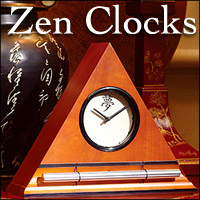 zen alarm clocks are Pythagorean Tuned Pythagorean Tuning
The special tuning of the Zen Alarm Clock’s chime takes its inspiration from the ancient Greek master Pythagoras who lived in the 6th century B.C. Pythagoras is one of history’s most mystical geniuses. Although he is best known for his theorem in geometry, Pythagoras was primarily a religious teacher, and his understanding of the universe retains much vitality for our day. Pythagoras embodied the ancient Greeks’ zest for understanding and their passion for the “physics of spirit.”
Pythagoras’ spirituality was informed by the ancient cult of Orpheus, the Greek God of music and science. And the tradition of Orpheus has continued to be a potent source of artistic inspiration down through the ages. Legend recounts how Orpheus was given a lyre by Apollo and was taught to play by the muses. By playing his lyre, Orpheus produced harmonies that joined all of nature together in peace and joy. In Greek mythology, Orpheus, through his music, acts as the mediator between humanity and the gods—fitting together that which is separate. And this is the definition of harmony: an agreement between disagreeing elements.
Inspired by this Orphic tradition of music and science, Pythagoras was led to conduct perhaps the world’s first physics experiment. By playing strings of different lengths, Pythagoras discovered that sound vibrations naturally occur in a sequence of whole tones or notes that repeat in a pattern of seven. Like the seven naturally occurring colors of the rainbow, the octave of seven tones we recognize as “do re mi fa so la ti” reveals the sevenfold structure that orders all vibrations in the universe. These tones can be identified by their specific vibrational frequencies which are measured in cycles per second.
In the course of his experiments with sound, Pythagoras discovered that certain tones sound very good together, while other combinations of tones are rather displeasing.
One combination of tones that always sounds good together is known as the Fifth. The Fifth is a harmonic sound produced when two tones are in a relationship of 3 to 2. In other words, the Fifth is sounded when one tone is vibrating one-and-a-half times as fast as the other.
For example, if you sound a middle “C” on the piano, and then sound the “G” five notes ahead on the scale, it will sound satisfying and harmonious.
Since its discovery by Pythagoras, the Fifth has come to be universally recognized for its beauty; it forms the structural basis of musical compositions in almost every cultural tradition. The Fifth is an archetypal expression of harmony that demonstrates the “fitting together” of microcosm and macrocosm in an inseparable whole. That is, the Fifth is a beautiful sound because it demonstrates how the universe works.
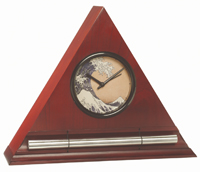 chime alarm clocks by Now & Zen Now & Zen Headquarter Store
1638 Pearl Street
Boulder, CO 80302
(800) 779-6383
Posted in Bamboo Chime Clocks
 musical chime and gong alarm clocks by Now & Zen, Inc. Set Time Aside to Sleep!
Changing Your Life and Your Alarm Clock: Getting More Sleep Can Improve Your Health
By LARA SALAHI (@larasalahi1) and CHRISTINE BROZYNA
Amid the hustle of every day stress, there are some simple steps people can take to get a better night’s sleep.
“You need to set aside the time for sleep. You need a few hours to unwind before. It takes time for the brain to wind down,” said Dr. Charles Czeisler, professor of sleep medicine at Harvard Medical School.
At Northside Hospital Sleep Disorders Center Roberts was taught “sleep hygiene,” — a healthy routine that should be practiced before bed.
Also, choosing the right alarm clock can make all the difference in the world. The Zen Alarm Clocks with chimes is the perfect, peaceful solution. Invest in gentle and relaxing sleep tools like The Zen Alarm Clock or The Zen Timepiece with Tibetan-bowl gong!
 gong alarm clocks offer alternatives to jarring, loud alarm clocks Now & Zen Headquarter Store
1638 Pearl Street
Boulder, CO 80302
(800) 779-6383
Posted in Bamboo Chime Clocks, sleep, Sleep Habits
 Katsushika Hokusai Ukiyo-e, Japanese Iris There’s a good reason that people say you should “sleep on it” when facing a tough problem—it helps! A new study suggests dreaming is beneficial for problem solving. Psychology Today reports, “In REM sleep, cortical activation spreads from whatever one’s been pondering to marshal associated ideas, thanks to changes in levels of the neurotransmitters norepinephrine and acetylcholine.” Jasper Johns, Jack Nicklaus and many others have credited their dreams for successful ideas. A co-author of the study adds: “So many times, we already have the solution somewhere in our brain. It just needs an extra ‘boost’ before it can be accessed.”
adapted from Psychology Today by Elizabeth Ryan, October 2009
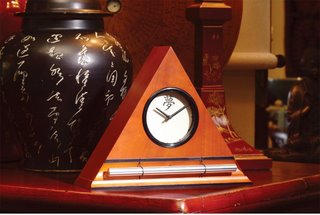 Zen Alarm Clock Now & Zen’s Alarm Clock Headquarter Store
1638 Pearl Street
Boulder, CO 80302
(800) 779-6383
Posted in Bamboo Chime Clocks, Chime Alarm Clocks, Japanese Inspired Zen Clocks, Natural Awakening, Now & Zen Alarm Clocks, Sleep Habits, Ukiyo-e, Well-being
 sleeping in can change your life Changing Your Life: Getting More Sleep Can Improve Your Health
By LARA SALAHI (@larasalahi1) and CHRISTINE BROZYNA
Researchers say lack of sleep is connected to cardiovascular disease, hypertension and high blood pressure. It also compromises the immune system, contributes to obesity and severely impairs mental judgment.Dieting might be more difficult too. Recent findings also show that when you are sleep deprived, your body actually boosts production of the hormone that makes you hungry.
But research suggests that getting just one extra hour of sleep each night could dramatically affect your health. In fact, researchers from the University of Chicago found that those who bumped up their hours of sleep, from 6 to 7 hours had a 33 percent decreased chance of having clogged arteries.
Just the anticipation of an alarm clock jolting you awake can contribute to poor sleep habits and the lose of sleep. Using a soothing, chime alarm clock will help you avoid this anxiety. The maker’s of the Zen Alarm Clock have mastered this with the production of their entire line of soothing, Chime and Gong Alarm Clocks with real acoustic sounds.
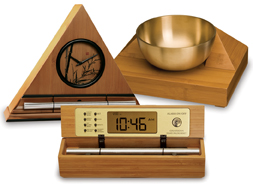 Soothing chime and gong alarm clocks by Now & Zen, Inc. Now & Zen, Inc.
1638 Pearl Street
Boulder, CO 80302
(800) 779-6383
Posted in Bamboo Chime Clocks, Now & Zen Alarm Clocks, Well-being
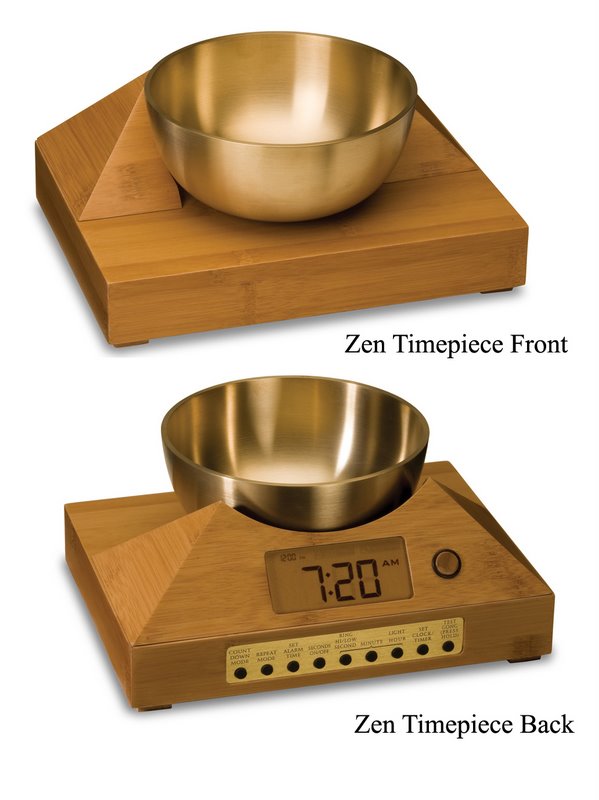 gong and chime alarm clocks are the best gentle alarm clocks Boulder, Colorado—an innovative company has taken one of life’s most unpleasant experiences (being startled awake by your alarm clock early Monday morning), and transformed it into something to actually look forward to. “The Zen Alarm Clock,” uses soothing acoustic chimes that awaken users gently and gradually, making waking up a real pleasure.
What makes this gentle awakening experience so exquisite is the sound of the natural acoustic chime, which has been tuned to produce the same tones as the tuning forks used by musical therapists. According to the product’s inventor, Steve McIntosh, “once you experience this way of being gradually awakened with beautiful acoustic tones, no other alarm clock will ever do.”
 change your alarm clock, Now & Zen Alarm Clock Shop - Boulder, CO Now & Zen – The Gong & Chime Alarm Clock Store
1638 Pearl Street
Boulder, CO 80302
(800) 779-6383
Posted in Bamboo Chime Clocks, Now & Zen Alarm Clocks
« Previous Page — « Previous Entries
Next Entries » — Next Page »
|
|
|
|